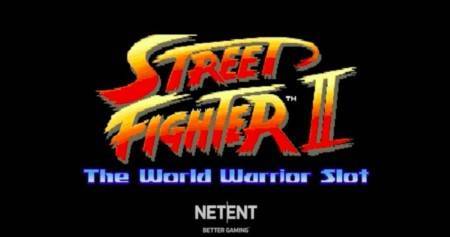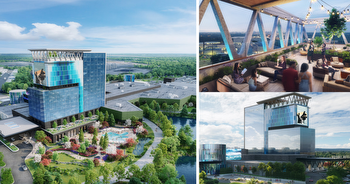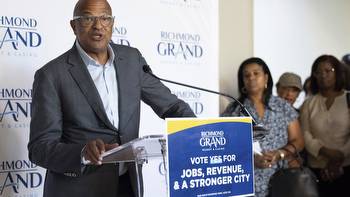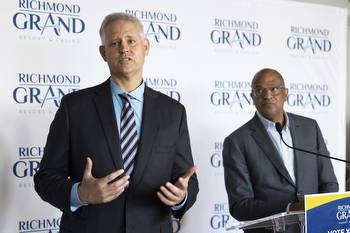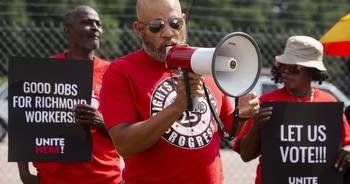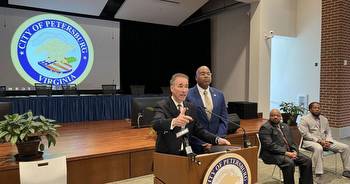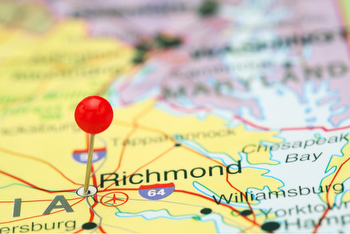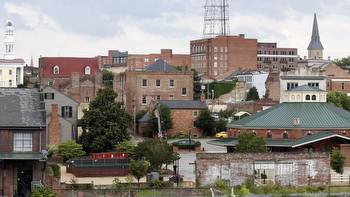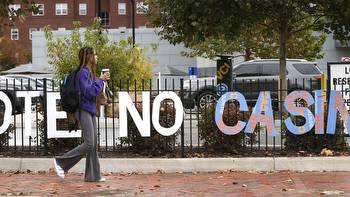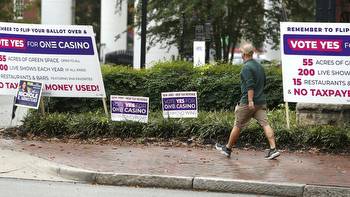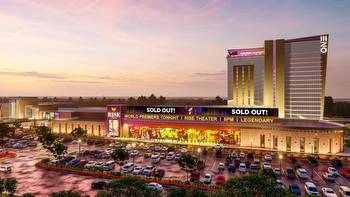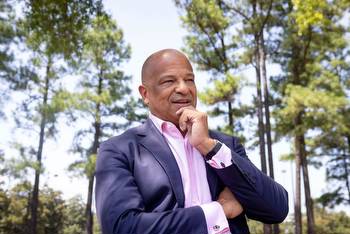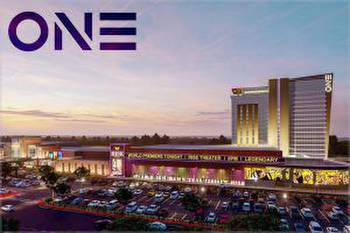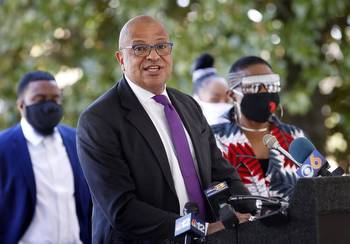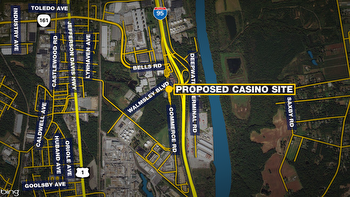Casino referendum campaigns ramp up ahead of Election Day next month
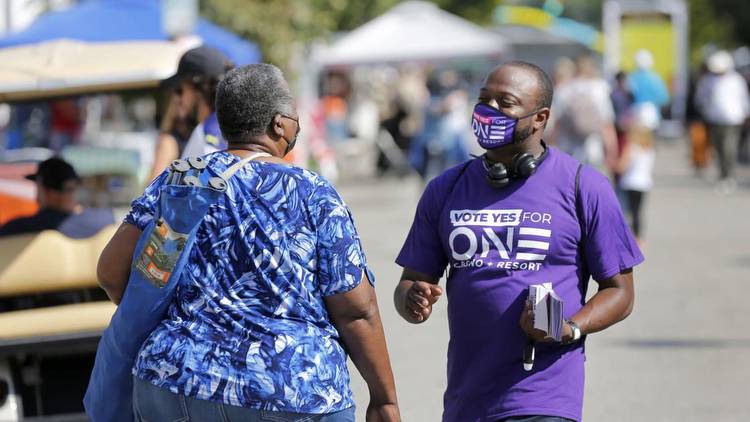
Richmond voters are barrelling toward a decision about whether the One Casino will rise.
Urban media magnate Alfred Liggins says his plans for a $565 million casino resort with a 250-room luxury hotel off I-95 can transform a part of south Richmond that residents and city leaders say has been neglected for far too long. Critics, however, say that casino gambling is likely to harm the majority-Black neighborhoods that Liggins and project backers say they are trying to uplift.
No other Virginia city has rejected casino plans since Gov. Ralph Northam and state lawmakers last year agreed to permit them in five cities.
Liggins and his business partners are nonetheless spending more than $1 million to win the referendum as Election Day on Nov. 2 looms. Activists with far fewer dollars face long odds in their campaign to defeat the project.
Billboards, campaign mailers and television and radio ads trumpet projected benefits such as $30 million in annual tax revenue for the city and 1,500 permanent jobs that pay an average of $55,000 per year, which is about $20,000 more than what half the households in the area near the proposed casino location make, according to U.S. Census data.
Some, however, are dubious about about whether taking people’s money at slot machines and card tables can genuinely bring about economic justice and racial equity in Richmond.
“The overwhelming bulk of it will be lost by people in Richmond and from the surrounding area,” says Paul Goldman, a longtime Democratic strategist who has been campaigning against the project along with the activist collective Richmond for All. “I think it’s time to stop saying that the only way you’re going to help kids and schools is through some special gimmick.”
Liggins, the CEO of Urban One, and and son of the company’s founder, Cathy Hughes, says his interests in Richmond and the gaming industry is based on the company’s orientation toward Black audiences and entertainment. Kiss 99.3 and 105.7; The Box 99.5 and 102.7; iPower 92.1; and Praise 104.7 in the Richmond area are four of the 53 radio stations it operates in 14 market regions across the country.
Urban One has already been a nominal player in the gaming industry for a few years as a minority shareholder in the MGM National Harbor Casino in Maryland.
If voters approve the plan this fall, the proposed One Casino in Richmond would be the only Black-owned casino in the United States, Liggins says.
“It’s not just about gaming. And it never was,” he said. “It’s about opportunity, inclusion, tax revenue and jobs — and what it could do for the city, its people and minority communities.”
Sitting in the posh dining room of the Jefferson Hotel during a visit to Richmond last month, Liggins said he saw an opportunity to expand his company and “help” the city when discussions in the Virginia General Assembly about the legalization of casino gambling in the state started intensifying a few years ago.
As sports betting and emporiums with slots-like games have proliferated in Virginia, Liggins said adults generally have agency to gamble responsibly if they so wish. “The benefits far outweigh the negative impact that it will have on a small number of people who don’t have the ability to control their personal habits,” he said.
“The critics say ... minority communities don’t have that ability,” Liggins added. “I think that’s wrong.”
Voters in Norfolk, Portsmouth, Danville and Bristol last year overwhelmingly approved plans for casinos in their respective communities under a new state law allowing Richmond and the other four economically beleaguered localities to permit a casino, subject to approval by the Virginia Lottery Board.
When Richmond started seeking casino development proposals, Urban One partnered with Peninsula Pacific Entertainment, the owner and operator of the Colonial Downs race track and chain of Rosie’s gaming emporiums, to submit the One Casino plan.
The two companies have put more than $1 million on the line pitching the project, according to campaign finance disclosures required by state law.
A finance report for the latest disclosure period show that Urban One and Peninsula Pacific infused about $400,000 and spent $87,000 in August through a special campaign committee, but the two companies ahead of the next reporting deadline on Oct. 15 recently had to disclose several large in-kind and cash contributions that amounted to $660,000.
Liggins and other campaign officials said most of the money will be used on media advertisements, postage and printing costs for campaign mailers and personnel to hype the project and inform audiences about proposed community benefits, such as a $25.5 million upfront payment to the city if the referendum passes and $16 million for Richmond Public Schools, cities agencies and charity organizations over the next decade.
The projected annual gambling revenue, Goldman and others point out, has to come from people’s pockets.
“Casinos are extractive,” said Quinton Robbins, the head of Richmond for All’s anti-casino campaign. “They talk about also building an entertainment venue and recording studio there. That’s great and the kind of development we support ... but they’re coming here to build a casino.”
Richmond for All members have lobbied against the project in recent months by speaking at public meetings and canvassing residents around the proposed project site. The group said in July that it knocked on 175 doors in the voter precinct where the project is located over several weeks this summer. Out of the 37 people who answered, 45% said they were opposed to it, while 25% were still undecided, according to Robbins.
The activists say they are also concerned about the casino backers’ exerting influence on politicians.
Urban One and Liggins have donated approximately $100,000 to local and state politicians since last year, with most of the dollars directed to key members of the Virginia Legislative Black Caucus, including nearly $30,000 for its chairman, Del. Lamont Bagby, D-Henrico, and $10,000 for House Appropriations Chairman Luke Torian, D-Prince William, who made minority ownership and investment a priority in the state casino bill. Liggins also gave $5,000 to Virginia Attorney General Mark Herring at the end of June.
Critics have also raised questions about ties project investors have to politicians and regulatory bodies, including Chris Tsui, a local restuaraunteur who stepped down from the Virginia Lottery Board earlier this year. (Neil Amin, CEO of Shamin Hotels, which owns the building where the Richmond Times-Dispatch’s downtown offices are located, is also a listed investor in the project.)
Liggins has previously denied corruption allegations, saying that his personal campaign contributions are based on his support of the Democratic Party and individual candidates’ platforms.
Not all Democrats and area politicians, however, are supportive of the project.
U.S. Sen. Tim Kaine, who lives in Richmond, for example, voted against the project when he cast his ballot early two weeks ago. “He believes there are better ways to enhance economic development in Richmond,” a spokesperson for his office said in an email.
Richmond School Board member Kenya Gibson, Stephanie Rizzi and Jonathan Young have also said they are opposed to the casino.
Goldman says Urban One and Peninsula Pacific wouldn’t be spending $1 million if their own polling showed that most people would vote for the project.
Robbins and Goldman say they have raised around $15,000 so far to counter the pro-casino campaign’s messaging. Richmond for All has yet to report any recent campaign activity to election officials, but Goldman has reported $4,000 in campaign contributions.
Despite the financial disadvantage, Robbins says local activists have previously triumphed in similar David-versus-Goliath scenarios, citing campaigns against the city’s failed $1.5 billion Navy Hill redevelopment plan for downtown Richmond and a Shockoe Bottom redevelopment project what would have been anchored by a baseball stadium near the city’s first public African American burial ground.
“We’ve got a history of being scrappy with limited resources,” he said.
The project opponents say systemic racism and government choices have disenfranchised communities around the proposed casino. Some residents, however, say they are hopeful about it.
“I think it’s a good thing ... that needs to happen for the black community to help strengthen it,” said 62-year-old Kenneth Baker while visiting one of his neighbors on Lynhaven Avenue, a residential street near the industrial area where the casino is being proposed on land currently owned by Philip Morris USA. “I think it’s going to benefit the people who live in this area.”
As the city earlier this year considered the six casino development proposals, the selection process became mired in controversy when anonymously distributed flyers opposed to a casino plan on Arthur Ashe Boulevard read: “Tell them to build it over there.”
The exhortation was interpreted by many to mean the Urban One project, drawing a swift rebuke from critics who said it implied the casino should be built in an area where about 9 out of 10 residents are Black or Hispanic, despite protests against casino proposals in other areas where residents said it would lower their quality of life by creating traffic congestion and crime.
But unlike neighborhoods and residents around the Boulevard and Forest Hill Avenue area, where another casino was proposed, a few south Richmond civic groups endorsed the One Casino, saying it would be a boost for a community where 1 in 3 households live in poverty.
Amos Walter, who lives in the Davee Gardens neighborhood near the One Casino site, said he intends to vote for it.
“It’s the first thing I’m going to check [on the ballot]. I like it,” said Walter, 69. “It’d give me a place to walk to. ... And I’m sure police will be there. I’d probably feel safer there than going to Burger King to get a sandwich.”
Some neighbors are unsure how they will vote.
Jessica Smith, who also lives in Davee Gardens, said she is largely unfamiliar with the project.
Smith, 26, said she isn’t necessarily opposed to casino gambling, but fears its addictive nature. “There was one time I was gambling and I got so frustrated because I wasn’t winning. I kept wanting to play,” she said. “That’s why my mom says you need to know when to stop.”
She said she’s unsure why someone would want to build a casion in the area, adding that she would like to see the city improve road conditions and address traffic congestion there if it does rise.
“These roads are bumpy and messing up the alignment on my car,” Smith said as a friend was finishing work on it in front of her house. “The ride is rocky over here, but they’re talking about building a casino? C’mon now.”
Liggins said he disagrees with the notion that casinos are inherently a drain on surrounding communities, adding that the city is not offering any financial incentives or tax breaks.
“I don’t view it as taking advantage or preying on people,” he said. “I see it as pumping resources back into communities that generally don’t have these opportunities.”
Robbins, the director of Richmond for All’s anti-casino campaign, says it’s not worth the potential risks. He and other campaign organizers say they hope they can gin up more money soon to let voters know the casino project is not a done deal.
“I think the role of the economic development should not be to serve corporate donors. It instead should serve the people of Richmond by helping them start small business, keep financial resources in the community and generate tax revenue,” Robbins said. “If this project fails or if they decide to leave because they aren’t making enough money, then we’ll lose pretty substantial revenue.”
Goldman says a professional poll by Mason-Dixon Polling & Strategy that he commissioned in June found that public opinion is about evenly split. He declined to share the polling report, however, and did not provide information about the sample size, respondent demographics and what other questions were asked. Liggins dismissed Goldman’s poll, but also declined to share information or copies of his campaign’s internal polling.







